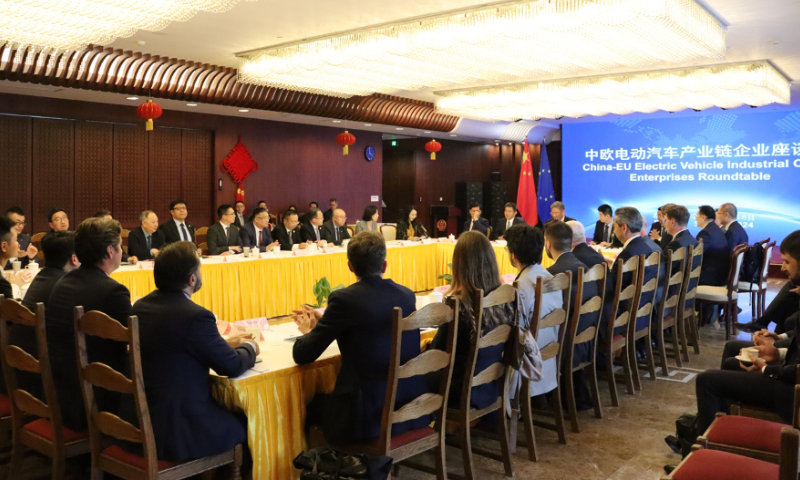
The China-Europe Electric Vehicle (EV) Industrial Chain Enterprises Roundtable is held on September 18, 2024 in Brussels. Photo: Courtesy of the China Chamber of Commerce to the EU (CCCEU)
In the face of the EU's anti-subsidy investigation into electric vehicles (EVs) from China, the Chinese side will remain committed to EV negotiations until the final moment, Chinese Minister of Commerce Wang Wentao said on Wednesday (local time) during the "China-Europe Electric Vehicle (EV) Industrial Chain Enterprises Roundtable" in Brussels.
Experts said that Wang's remarks reiterated China's sincerity in addressing trade disputes through dialogue and communication, instead of unilateral actions. The EU should listen to the rational voices from its member states and treat economic and trade cooperation with China in a pragmatic manner, they noted.
During the roundtable, Wang said that the reasonableness, compliance and fairness of the EU's anti-subsidy investigation into China's EVs have been widely questioned. This European move will hinder cooperation between China and Europe in the automobile industry, dampen the confidence of Chinese enterprises in investing in Europe, and seriously affect global cooperation in dealing with climate change. It will also jeopardize the multilateral trade order based on the WTO rules, he said.
The Chinese government firmly supports cooperation between Chinese and European companies, opposes "decoupling," and firmly safeguards the legitimate rights and interests of Chinese enterprises and EU enterprises in China, Wang stressed.
"Wang's remarks reflected that China still hopes to resolve bilateral economic and trade friction through consultation and will not take unilateral actions, which demonstrates our sincerity," Jian Junbo, deputy director of the Center for China-Europe Relations at Fudan University's Institute of International Studies, told the Global Times on Thursday.
The meeting was attended by about 30 companies and industry associations from the EV sectors in China and Europe, including the China Chamber of Commerce to the EU (CCCEU), the China Chamber of Commerce for Import & Export of Machinery & Electronic Products, and representatives from SAIC, BYD, CATL, Volkswagen, Mercedes-Benz and BMW, according to a statement that the CCCEU sent to the Global Times on Thursday.
During the meeting, participants said that the cooperation scope of the China-EU EV industrial chain is broad. EU enterprises do not fear competition, do not need tariff protection, oppose trade protectionism, and support free trade, market openness and fair competition.
They called on Chinese and European vehicle industrial chain enterprises to seize the opportunity to deepen cooperation, and hoped the two sides can properly resolve the anti-subsidy case through dialogue and consultation, in a bid to prevent the trade friction from escalating out of control, and to create a fair environment for industrial cooperation.
According to a report by Politico, the EU's national trade experts will not vote next week to impose duties on made-in-China EVs, three EU diplomats said, with the point taken off the agenda of a September 25 meeting of the bloc's Trade Defense Instruments Committee.
Rational views of some member states such as Germany, Italy and Spain will affect the EU's final decision, so in the consultations with the EU, we have seen some positive signs, Jian said.
Wang met with Antonio Tajani, Italy's deputy prime minister and minister of foreign affairs and international cooperation, on Monday, during which Tajani said that the Italian government hoped that Europe and China will reach a solution through dialogue and consultation, while welcoming Chinese auto companies to invest in Italy.
Germany's Economics Minister Robert Habeck said on Tuesday in a statement that the European Commission and China should work toward a negotiated solution, emphasizing China's significance to the German and European economies, according to the Xinhua News Agency.
Earlier, Spanish Prime Minister Pedro Sanchez before the end of his visit to China called on the EU to reconsider tariffs on Chinese EVs.




